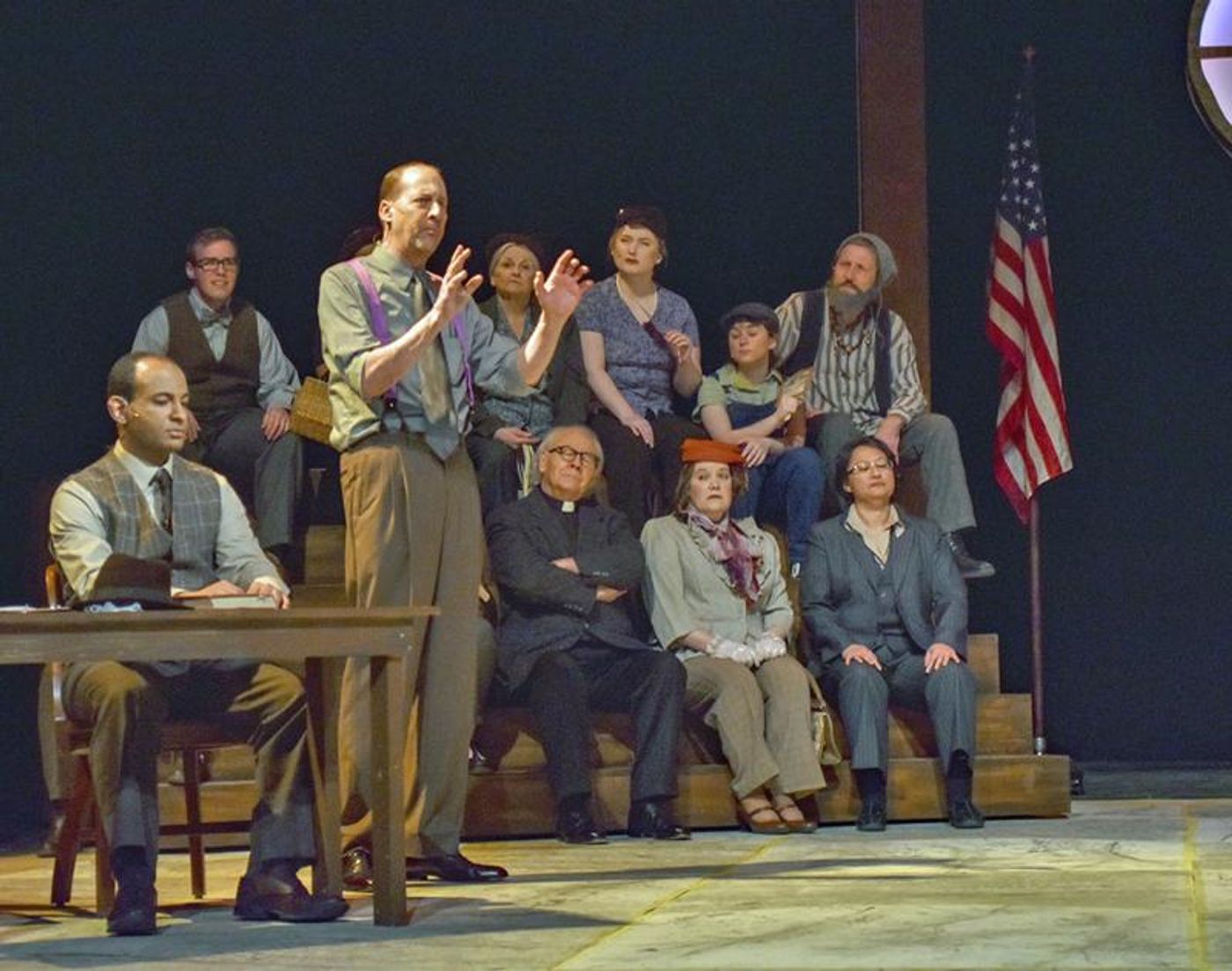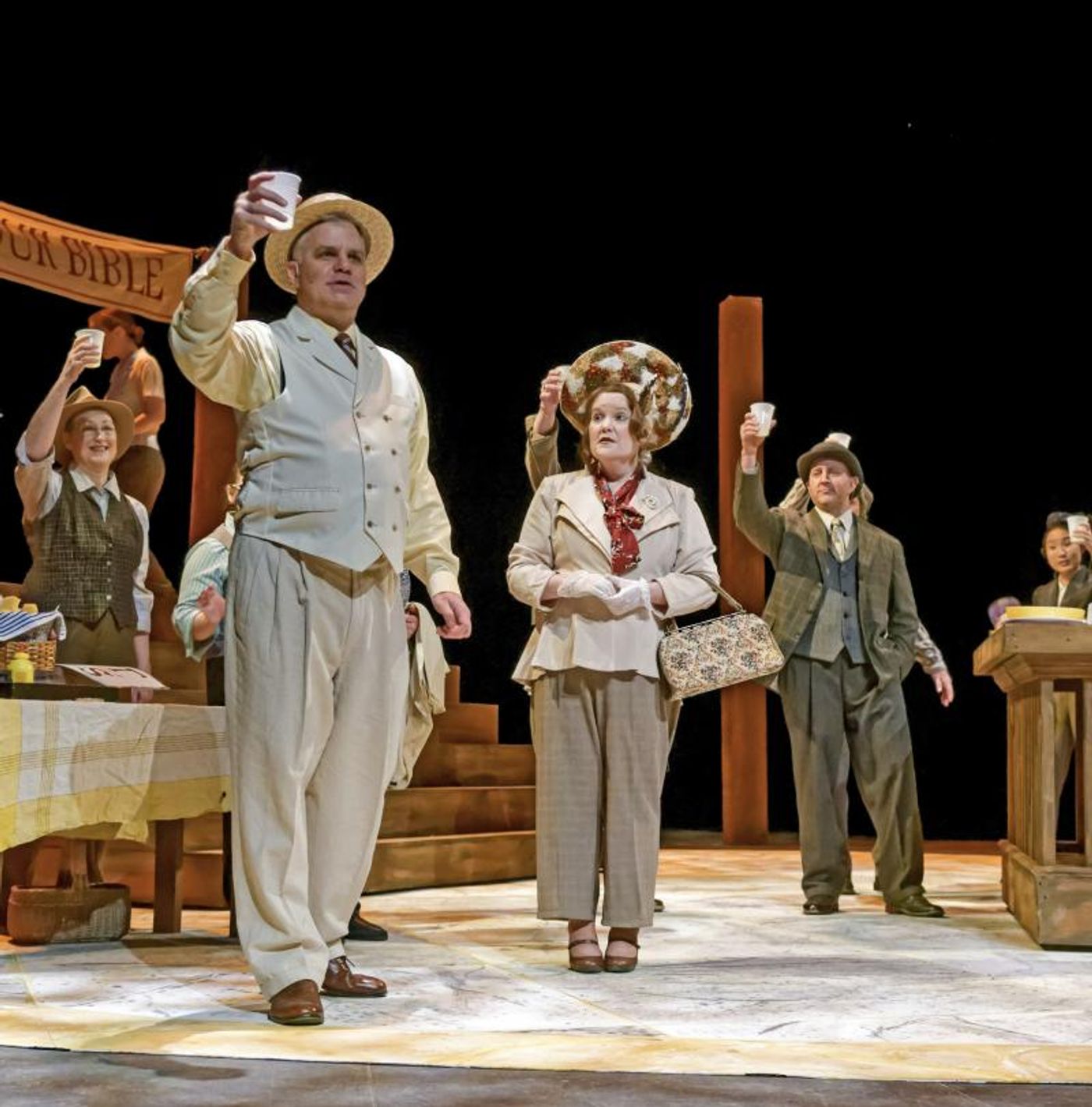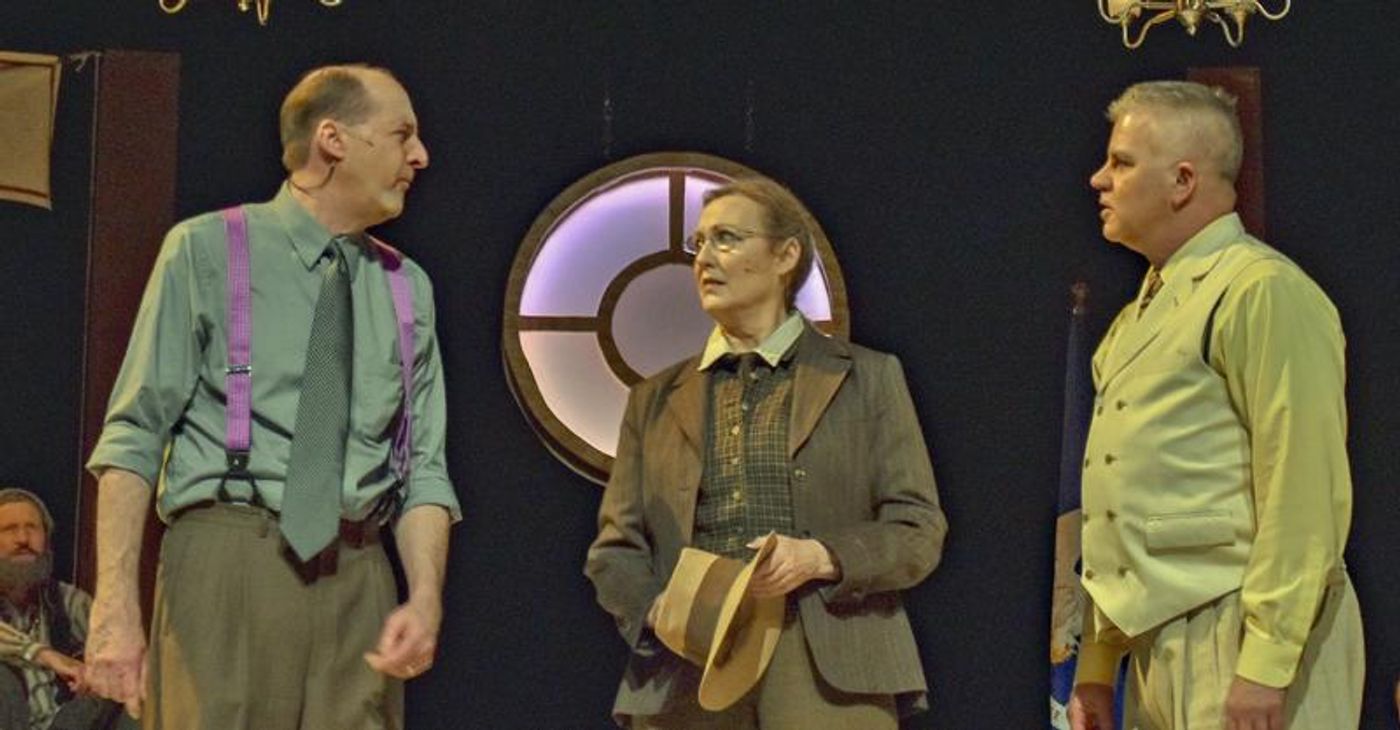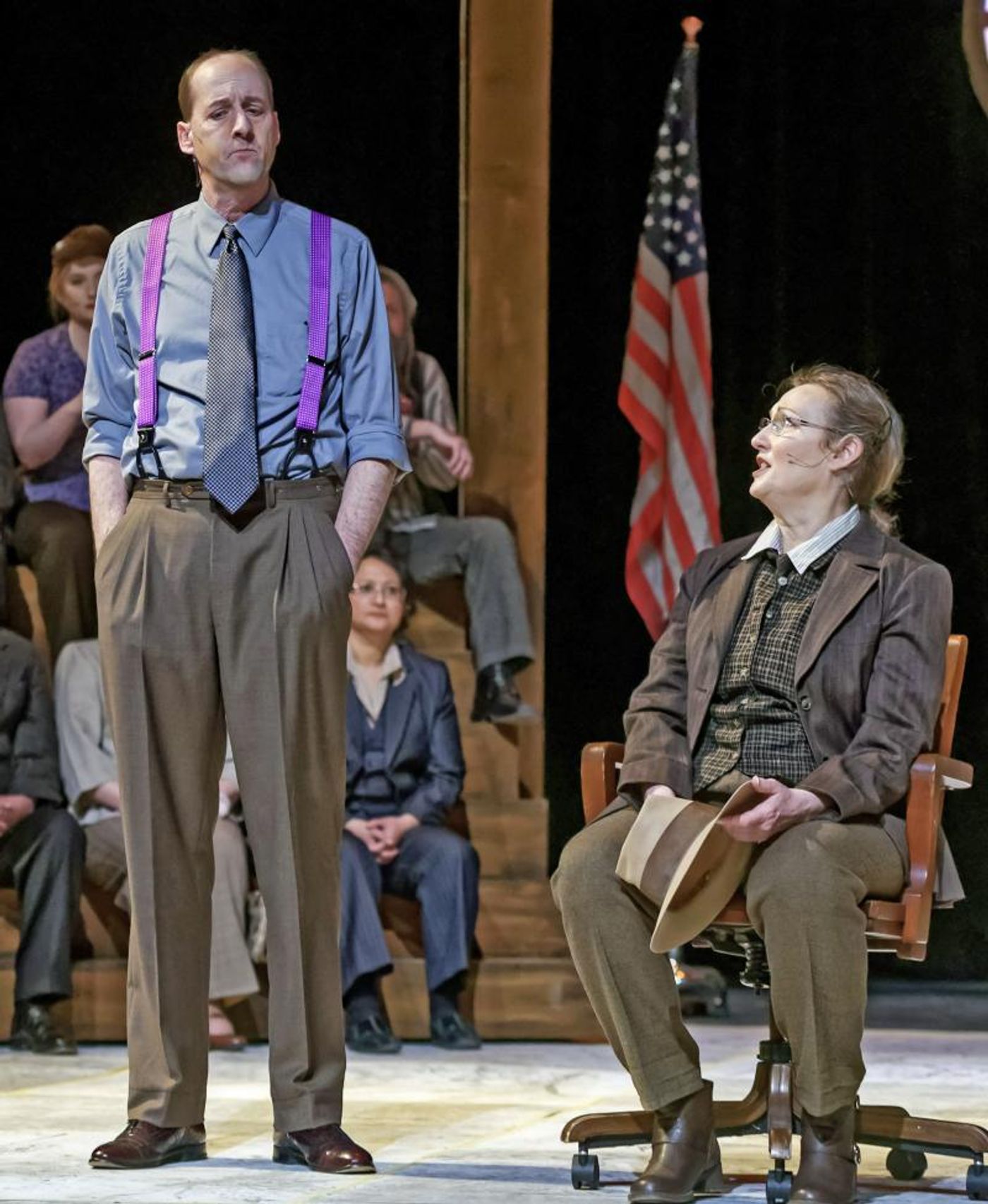Review: INHERIT THE WIND at White Theatre
Certain powerful pieces of literature stay with you for a lifetime. "Inherit the Wind" by Jerome Lawrence and Robert E. Lee is one of those for me. "Inherit the Wind" is a fictional construction inspired by the 1925 Scopes Monkey Trial and as a screed against the "Red Scare" activities of Wisconsin Senator (R) Joseph McCarthy during the early 1950s.

The Jewish Community Center's production of Lawrence and Lee's breakthrough play is community theater at its most ambitious. Director Bill Christie's decisions to offer the story in the most presentational of styles and to seek permission to cast against gender and race are consistent throughout.
The play belongs to the lawyers and to the playwrights. The confrontation between ideas in the courtroom is stunning. Stan Cole as Brady (Bryan) and R. Kevan Myers as Drummond (Darrow) requires very advanced acting technique. In order for the play to work, the director needs to achieve a leveling of performance across all the players.
 "Inherit the Wind" as performed in the White Theatre at this time in history does great service to the worldwide fight against bigotry, but perhaps not as much to truth of the Scopes Trial. The playwrights took pains to point out the fictions. It remains, however, a powerful piece of theater especially following the horrendous murders of Islamic worshipers in New Zealand, Jewish worshipers in Pittsburgh, and the never-ending wars of ethnic cleansing in the Middle East.
"Inherit the Wind" as performed in the White Theatre at this time in history does great service to the worldwide fight against bigotry, but perhaps not as much to truth of the Scopes Trial. The playwrights took pains to point out the fictions. It remains, however, a powerful piece of theater especially following the horrendous murders of Islamic worshipers in New Zealand, Jewish worshipers in Pittsburgh, and the never-ending wars of ethnic cleansing in the Middle East.
Another of these insults to humanity occurred just five years ago feet from where "Inherit the Wind" is now performed. Three individuals died when lifetime White Supremacist Frazier Glenn Miller, Jr. pulled up in front of the White Theater and opened fire. A young man and his Grandfather were killed. Miller then drove to a neighboring, Jewish themed, senior living facility and continued his killing spree. Miller acted out of an overwhelming hatred for Jews. It is ironic that none of those he mowed down were Jewish. Miller awaits execution by lethal injection in a Kansas penitentiary.
"Inherit the Wind" is a thinly veiled classic reinterpretation of a courtroom confrontation between former World War I era Secretary of State and Democratic Presidential Candidate William Jennings Bryan and Criminal Defense Attorney Clarence Darrow.

It is tempting for an audience to see the play as a simple retelling of history. Much of the classic confrontation scene does come from the court transcript, but not all. William Jennings Bryan was not ambushed by Clarence Darrow on the witness stand. These two giants had been fighting exactly this fight for years in correspondence. For these reasons and the passage of time, the choice to cast women in some male roles is appropriate and insightful.
In the play, a high school science teacher, Bertram Cates, is accused of breaking a state law by teaching Darwin's "Origin of Species" to a high school science class. Attorney Henry Drummond rushes to take up Cates cause at the behest of the Baltimore Sun and Minister Mathew Brady defends the law and Biblical Scripture that cannot coexist in the same universe as Darwin's 1859 theory. (There are actually at least three Darwin books on evolution.) Cates is in a relationship with the daughter of the local fundamentalist minister. He is jailed for his beliefs and the townies rise up to almost lynch Teacher Cates.
 The true story of the Scopes trial is less dramatic. To be sure, there was the confrontation between the Bryan (Brady) character and the Darrow (Drummond) character, but each was actually there for his own reasons. John T. Scopes was tangential to the trial. The town of Dayton Tennessee was significantly less hostile than portrayed. The Scopes trial was the first event of its kind broadcast to a nationwide audience over WGN Radio-Chicago (World's Greatest Newspaper), but sadly no one thought or was able to record the event in 1925. The love story is the playwright's invention.
The true story of the Scopes trial is less dramatic. To be sure, there was the confrontation between the Bryan (Brady) character and the Darrow (Drummond) character, but each was actually there for his own reasons. John T. Scopes was tangential to the trial. The town of Dayton Tennessee was significantly less hostile than portrayed. The Scopes trial was the first event of its kind broadcast to a nationwide audience over WGN Radio-Chicago (World's Greatest Newspaper), but sadly no one thought or was able to record the event in 1925. The love story is the playwright's invention.
In fact, the genesis of the Scopes Trial was a Chamber of Commerce effort to build tourism for Dayton Tennessee. John Scopes agreed to be charged for violating the Tennessee Butler Act, which forbade the teaching of evolution. The information was contained in a then standard text common to many Tennessee schools. John Scopes was never jailed. In fact, he reported on his own trial and swam in a mountain lake with William Jennings Bryan, Jr.
Well anyway, the ploy worked and how. The American Civil Liberties Union financed Scopes' defense and the World Christian Fundamental Association paid for the prosecution. H.L. Mencken sniped from the sidelines. Dayton got its tourism boost. The trial train left the station near the top of the hill and just picked up speed from then on.
John Scopes (like Bert Cates in the play) was convicted. William Jennings Bryan died in his sleep about a week later, but not as a result of a courtroom coronary. Clarence Darrow pursued appeals and eventually got the conviction overturned. In its opinion, the Tennessee Supreme Court sidestepped deciding the constitutionality of the Butler Act, but rendered its enforcement moot. John Scopes left town and became an engineer for a Venezuelan oil concern where no one knew him. The merits of Darwin's theory continue to be argued.
A film version premiered in Dayton in 1960. Residents (especially those who remembered 1925) were less than thrilled. Some version of "Inherit The Wind" runs somewhere daily and has for sixty-four years.
"Inherit the Wind" continues at The White Theatre through March 24. The strength of the play and where it is performed make it worth seeing. Tickets are available through the www.JKC.org or by telephone at 913.327-2700.
Photos courtesy of the White Theatre and Rich Fabac Photography.
Reader Reviews
Videos

